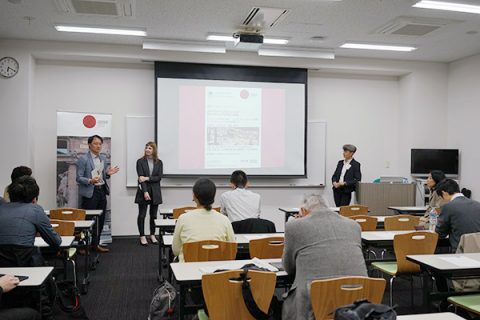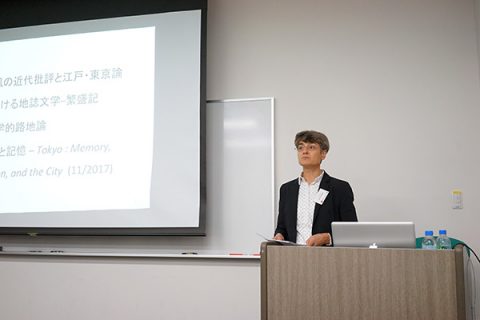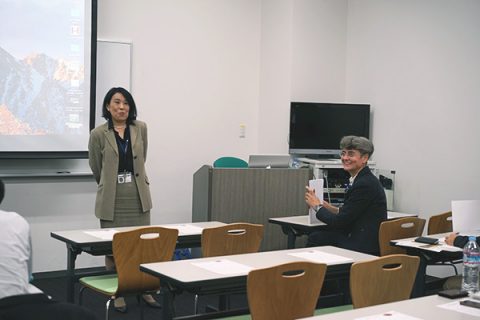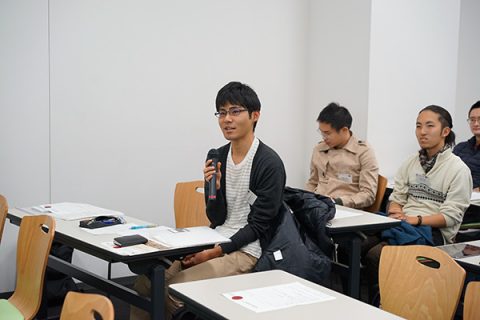On November 7th the Kyoto University European Center and the Heidelberg University Office Kyoto jointly held the 5th Japanese-German Joint Lecture at the Yoshida International Exchange Hall in Kyoto. The lecture was given by Prof. Evelyn Schulz, who graduated from Heidelberg University and has experienced staying abroad at Kyoto University. She is currently teaching at the Department for Asian Studies, Japan Center at Munich University. Her lecture held in Japanese was titled “Is the Japanese Society becoming a slow society?”
According to Prof. Schulz the advancing globalization, modernization and science at the beginning of the 19th century gave birth to the idea that growth equals progress. This value also became a central mode of thinking in Japan. It was met by contrary Japanese concepts like quietness (seijaku 静寂), seclusion from the world (inton 隠遁) and betweeness (aida 間). Therefore she interprets the modern Japan as “a quiet and harmony seeking country that is at the same time a high speed society”. In her lecture she used the examples of the changes in communicational behavior following the development of social media and the problem of “periphery” as a metropolitan space around Tokyo where local communities get left behind. She argued that there is the necessity of acknowledging values of “slow life” and urging the development of societies that are humane and sustainable because of these phenomenon within the accelerated modern society. Prof. Schulz also discussed the question if a “typical” Japanese slow down reaction following the shrinking economy and the 3.11 Earthquake in 2011 can be attested.
The commentary after the lecture by Prof. Schulz was provided by Prof. Mariko Yoshida, whose field of expertise is labor law and who stayed abroad for a very long time. She pointed out that on one hand Japanese have the attitude of working overtime and seeking perfection in their work, but are lacking of productivity at the same time. Her question “Isn’t Japans working environment already at the stage of slowing down?” was lively discussed in the question and answer session. Opinions on the slowing down of society were exchanged by participating faculty and staff members as well as students, who were asked if and how they experience the slowing down and at the same time accelerating society.
The 5th Japan-German Joint Lecture was made possible by a visit of University Research Administrator (URA) from Kyoto University European Center to Munich University in fall 2016. While meeting Prof. Schulz, she expressed her wish to deepen her exchange with researchers from Kyoto University and use the chance of coming to Japan for preparing a lecture.
While the discussion of “Industry 4.0” and “Society 5.0” etc. gathered pace in recent years, Prof. Schulz lecture gave the chance to rethink the future of society from a different point of view.
 URA Mr. Sonobe introducing the Nichi-Doku Joint Lecture URA Mr. Sonobe introducing the Nichi-Doku Joint Lecture |
 Prof. Schulz at the lecture Prof. Schulz at the lecture |
 Commentary given by Prof. Yoshida Commentary given by Prof. Yoshida |
 Students at the question and answer session Students at the question and answer session |
In order to promote and strengthen the research exchange between Heidelberg University and Kyoto University initiated the lecture series “Nichi-Doku Joint Lecture”. It is organized in close cooperation by the liaison offices of both universities—Heidelberg University Office in Kyoto and the Kyoto University European Center in Heidelberg.


